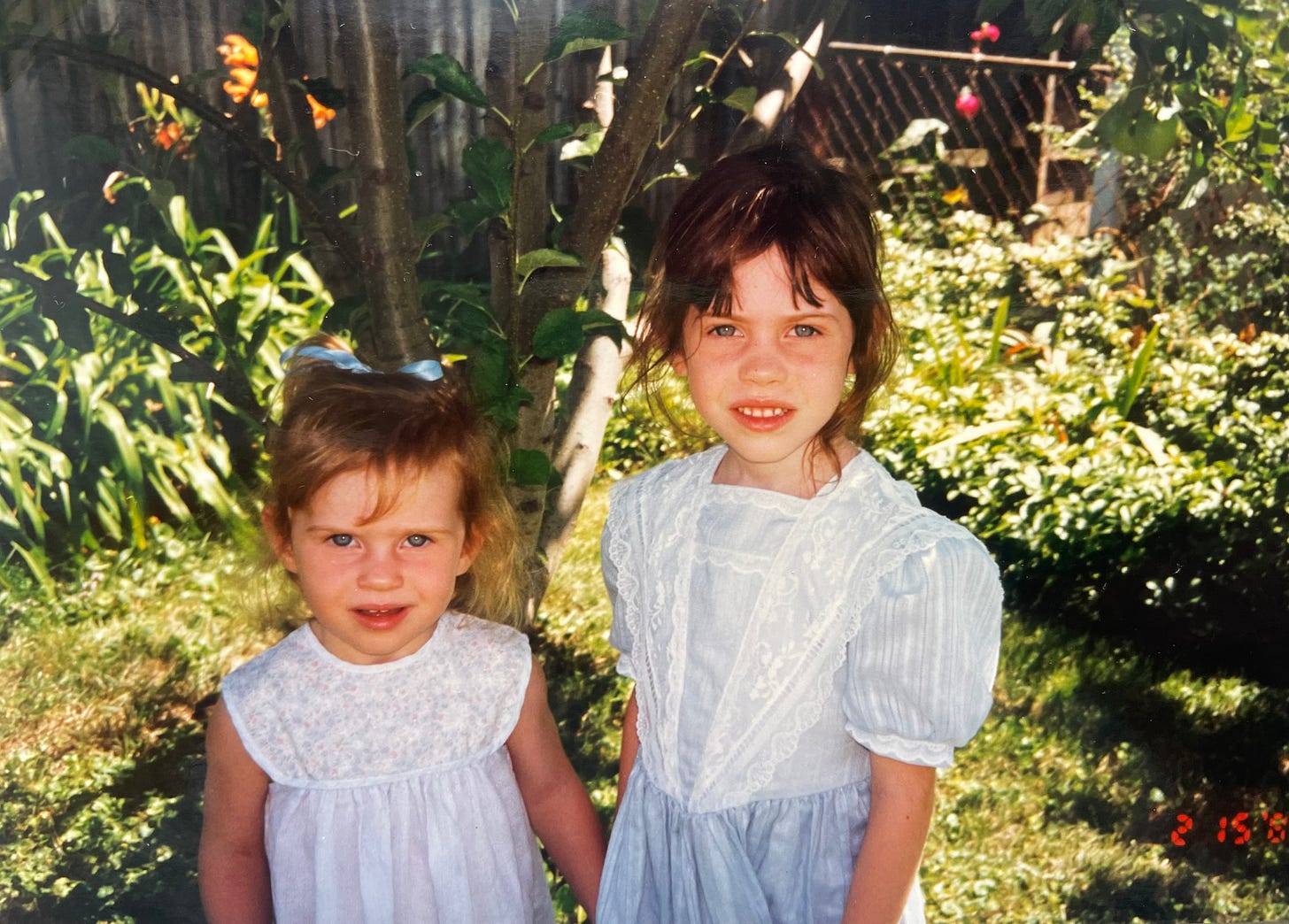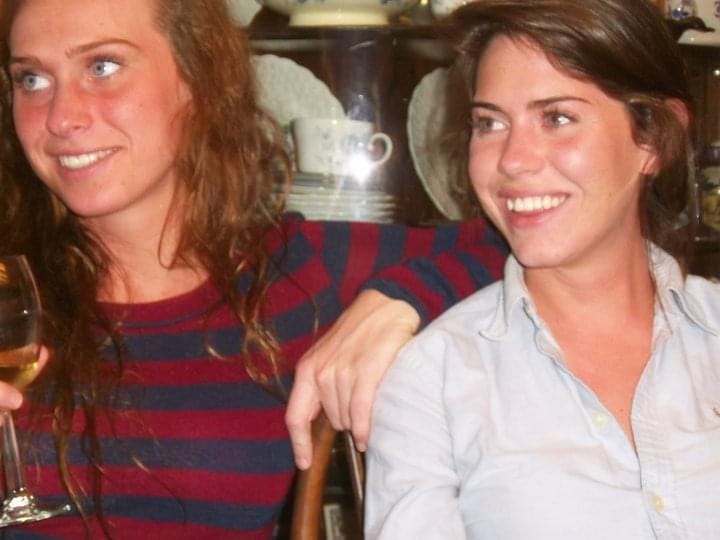The Bargain
An encounter in the checkout line leads Frances Dodds to examine the patterns of addiction in her family.
In the summer of 2016, there was a sense that things were falling apart, but could still be put back together. Trump was everywhere, but surely we’d be done with him in November. My younger sister was in rehab again, but we hoped this time would be different.
In the checkout line at the grocery store, a man and woman in front of me were tweaking on something, erratically industrious, hands fluttering over the conveyor belt. The woman was in her mid-thirties, tailored joggers cinched around her hips. Her dark hair was pulled back at the nape of her neck with a child’s fuzzy pink hair tie. They wanted to pay in cash, but kept counting the dollars and coming up short. The woman tried negotiating with the cashier, who kindly suggested they put something back. It all came down to a box of key lime custard mix or a pair of pantyhose. The woman was making the case for the pantyhose, but the man was hellbent on the custard; they were at an impasse. I watched the woman gesturing, bargaining, certain she could make it all work—that another dollar would reveal itself, or the cashier would see reason, and tonight she would have the dessert and tomorrow the pantyhose—sheer, presentable legs for the job hunt that would set her back on track, back on the path, back to living in the world with everyone else.
Watching her, I thought of a story my grandmother told my siblings and me at some point in the suggestible haze between childhood and adolescence. She grew up moving around California, one of twelve kids who all struggled with substance abuse at some point—all except for my grandmother, who became a missionary, and then a psychologist. In the 80s, one of my dad’s cousins, Karen, was a swimsuit model with a coke addiction. She stayed with my grandparents for a few months trying to get clean, but ended up in Hawaii living with a drug dealer. One night, Karen called my grandmother frantically, saying she thought he was going to kill her. My grandmother heard him come home, and Karen hung up. They found her dead days later. The autopsy showed she'd been injected with a lethal dose of an anticoagulant and died from internal hemorrhage.
One night, Karen called my grandmother frantically, saying she thought he was going to kill her. My grandmother heard him come home, and Karen hung up. They found her dead days later.
Growing up I understood this story as a shocking footnote in our family history, a morose aberration in the narrative. My immediate family was a prudish bunch of pastors, artists and academics, whose idea of trouble was a tablespoon of Bailey’s in their decaf and an episode of Mr. Bean. But over the five years prior my sister, L, had taken a dizzying nosedive into addiction—dropping out of college and having four children in record time with another addict twice her age. My parents were left raising the children as my sister devolved, from cocaine to crack to heroin to fentanyl, her orbits around reality growing more and more distant until she was all but untethered. And we were all left grasping at the “why” we’d missed.
In her brief window of becoming, L had been the only real athlete in the family, going to college on a soccer scholarship before things went south. My mom is a portrait artist, and she’d taught us all to draw what we saw. But L liked abstract art; she cut things up and rearranged the pieces. She was objectively beautiful—coppery blonde hair, blue eyes, strong teeth behind a haphazard smile—but in high school, a boyfriend said her body was “manly.” She had always been bullish and breakable at the same time, physically powerful but emotionally fragile. At a party, someone gave her cocaine, and she liked moving too fast to care what anyone thought. And somewhere in the midst of the grasping, I thought of Karen.
Then, gradually—then all at once—whatever I’d once seen as an aberration seemed more like a variation on the pattern. A few weeks before I’d stood in line at the grocery store, I’d gotten too drunk and woken up in a hospital near my apartment. I’d been at a work party; there was an open bar, then karaoke, then a taxi ride that must have ended at the hospital—or maybe outside my apartment, where a stranger found me and took me to the ER. I woke up in a dim room divided by brown curtains, fully dressed, shoes on—feet crossed at the ankles like I was napping in a meadow after a picnic. My purse was on the floor beside me, with my wallet and phone inside. I asked the woman at the front desk if I could leave. She handed me something to sign, and I walked out the sliding glass doors into a Bushwick sunrise.
Then, gradually—then all at once—whatever I’d once seen as an aberration seemed more like a variation on the pattern. A few weeks before I’d stood in line at the grocery store, I’d gotten too drunk and woken up in a hospital near my apartment.
That had never happened to me before, but I knew I’d been bargaining with the limits for a long time. From mini bottles on the train to dinner parties, and dropping it low on dance floors I didn’t remember, I’d now slipped someplace darker—chucking a water bottle at an Uber driver’s head, hurling gibberish accusations at my boyfriend, the sense that I became someone I wouldn’t want to meet when enough poison had bloomed in my brain, like dark ink twisting in clear water. Not ready to concede, I dragged myself into work, spent the day throwing up in the handicap bathroom, and told no one except my boyfriend and L, who was reachable since she was stuck in rehab.
“Don’t tell mom and dad,” I told her.
“Okay,” she said. “But maybe you should.”
“I don’t see the point in worrying them. I just need to figure this out myself,” I said.
“Like, if you can keep drinking?”
“If it’s something I can manage better.”
“You can try,” she said. “But it’s a thing with us. There is no in between.”
Eight years on from the summer of 2016, I often think about that conversation as the last time my sister and I were something like equals. I was older, she was younger. She had always moved with me, negotiating the parts of herself that didn’t fit in my shadow. But in that moment, I wondered if she might understand something I didn't—if she could be further down the road of reckoning than I was. If there was still hope for us to meet on the other side.
But even then, as I heard the words coming out of her mouth, firm and solidly formed, I felt her shifting beneath their weight. Obviously, I was still bargaining. But deep down, I knew she was too. Neither of us were strong enough for the other to lean on.
In the grocery store, as I waited for the negotiation in front of me to end, I thought about giving the woman a few dollars to stave off her misery for a night. But watching her—so certain she could have both the stockings and the key lime custard—a petty, sisterly rage slipped over me. It was like in high school, when L wore my clothes without asking. I’d chase her around the house trying to rip them off—not because I had any interest in wearing whatever was on her body but because we came from the same womb, had our backs rubbed by the same hands, were taught to draw the same bowls of fruit, without looking down at the page or lifting our pencils, so our hands would learn to trust our eyes. We made our marks on the same fresh snowdrifts, ran through the same tall Texas grass, cradled the same water balloons—so life-like in their precarity, jiggling above the sudden death of hot pavement. We had the same sense of humor—posed in the same family photo, in the same greasy shower caps—that Christmas we all got lice. We played a never-ending game of MASH in the same threadbare hammock, kicking off the porch railing in perfect unison, and heard the same story about a beautiful cousin murdered by drug dealers in Hawaii.
So why should she wear a sweater I’d saved up for, scooping sugary pecans into paper cups at the mall? Why should she ditch rehab after rehab my parents couldn't afford, insisting she didn’t need it, and have baby after baby she couldn't raise, insisting that motherhood would save her, when I could still drag myself into work after waking up in the hospital?
Or was this always the wrong question?
Addiction is a family disease. It is also a disease of decisions. When you’re bargaining, you still believe you have some power, some room for negotiation. You believe the final decision is not quite upon you, that you can put one more toe into the pool of inhibition or oblivion, loosen the reins for a few hours, pull yourself back from the brink. But the line between belief and delusion is always dancing like a desert horizon. And in the end, the only currency we bargain with is time. My sister promised she would come home for Thanksgiving, for Easter egg hunts, for her son’s fifth, sixth, seventh birthdays, for her daughter’s violin recital, for the twins’ first day of preschool. She would be there in a few hours, for dinner. And then she wouldn't come, but we could see she was on Facebook, somewhere outside of time, reposting baby pictures of her children. And as the night wore on, she'd repost even older pictures—of us, as kids, flipping off the couch, our round bellies taut in ballet leotards, or paddling around a pond in an upside-down car top carrier, cattails swaying around us in the wind. We were both bargaining. But whatever bargain she was cutting, she kept losing. And I…
I didn't want to think about this anymore. I wanted the negotiation dragging out in the checkout line to end. I wanted a drink. I tapped a toe ever so lightly on the ground. The woman heard me, or sensed a shift in the air—the world coming to the brink of its patience with her problems. She thrust the key lime custard toward the cashier, and pushed the stockings aside. She would come back for them, she promised. Tomorrow.







Frances - I just read your parents’ NYTimes story. Humbling, mind blowing, beautiful and unforgettable, thank you for sharing it and 🙏🏻 for your family’s strength, courage, and grace. - Ellen
The second eloquent and dead-on addiction piece I have read in the last few day's under the indefatigable Sari's auspices. As good an evocation of the addict's spiral into self-delusion as I know, and a stark reminder of what it was like. So grateful for that reminder of how blessed I am to have been in long-term recovery. I wish you only the very best.